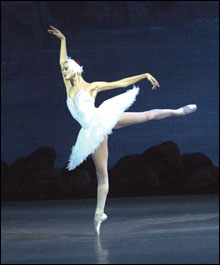
EYE OF THE STORM: Uliana Lopatkina as Odette. |
Swan Lake is ballet’s ultimate act of yearning. For just an instant, that opening F-sharp from the oboe hovers, between B major and B minor, flock and flight, castle and forest, sex and love, black and white. It’s a ballet for women who aren’t quite women and for men who kill the thing they love. Like Béla Bartók’s opera Duke Bluebeard’s Castle, which the BSO performed last night at Symphony Hall, it has a lake of tears, and like Bluebeard it’s music in a maze, with a protagonist poised between world and dream. Bartók maintains the mystery, and the agony, to the very end (the last word in the opera is “darkness”), Judith stranded between dream and nightmare. Tchaikovsky tries for glory, turning minor into major as Siegfried overcomes Rothbart, but it’s a mirage, like the end of his Fifth Symphony a decade later. The challenge for the dancers is to keep the tears flowing, to keep the lake from freezing over and a wedding party from processing over it.The Swan Lake that the Kirov Ballet and Orchestra have brought to the Wang Theatre this weekend is in essence the one they presented at Lincoln Center in July of 2002. It’s shaped, like the Boston Ballet edition of the 1990s, by former Kirov artistic director Konstantin Sergeyev, but where Boston’s Swan Lake was fairy-tale kaleidoscopic and comforting, the Kirov’s is muted, autumnal, the huge orange-leaved birches of the first act love going up in flames. The park in front of his mother’s castle, where Siegfried is celebrating his birthday, is the point of his initial breakout; acts two and four offer the forest as crypt, the freedom of Juliet’s tomb. Siegfried has his Jester (dropped from the 2004 Boston production), the Falstaff to his Prince Hal, a stay against nubile princesses but not against swans; when he runs off into the forest at the end of act one and act three, the Jester can’t follow. Still, they’re birds of a feather, Siegfried in his black doublet and white tights, the Jester halved in black and white. For the last two acts, Siegfried is all-white against Odile’s world black and Odette’s dream white; Odile might as well be Antonina Milyukova, the woman with whom Tchaikovsky entered into what he imagined would be a “white marriage” in 1877, just months after Swan Lake’s premiere.
The opening-night Odette/Odile and Siegfried (they’ll dance again on Sunday) were Uliana Lopatkina, last seen here in 2003 with the Kirov as a firebird of a Sheherazade, and Igor Zelensky, who at age 19 guested as Siegfried opposite Carla Stallings in the 1992 Boston Ballet Swan Lake. He remains a recessive, almost monastic, prince, more Hamlet than Hal, blond verging on bland. At the park he’s a fish out of water, his eyes barely kindling when he sees the crossbow his mother is giving him; he knows it’s the key to his destiny, he just doesn’t know how. Only when he arrives at Swan Lake does he realize that crossbows can’t unlock croisés, and from that point on he and Lopatkina move as in a dream, filling out conductor Mikhail Sinkevich’s adagissimo tempo as if it were a pillow they were stuffing with down. But he’s too white for Lopatkina’s Odile; that and his very modest variation (notable only for the kinetic kick of his forward leg in his manège) knock the stuffing out of the third act, and his containment continues to test her in the fourth.
 Related
Related:
Water and air, Bird brain, Acting up, More 
- Water and air
Bred in the city that Peter the Great built on a marsh to be Russia’s window onto Europe, the Kirov Ballet is equal parts water, air, and Euclid.
- Bird brain
The plays of Anton Chekhov don’t take well to dance.
- Acting up
The slight, dark-haired 32-year-old took the stage smiling and went right into the big hit.
- Back story
The English choreographer Matthew Bourne isn’t the first to propose an Oedipal dimension for Swan Lake .
- Nature studies
“A bird feeder,” Hamilton writes in her artist statement, “creates an intensified microcosm of the trials and hardships of avian existence.”
- The boards on a budget - side
- Company, present pillows!
All right, sorority girls and sleepover fiends, get those pillows fluffed and ready.
- Werner’s world
The world is doomed, and Werner Herzog, for one, is happy about it.
- Surf's Up
Is it coincidence or homage that a fat, sullen penguin in this animated dud resembles Michael Moore?
- One bird's opinion
One bird’s opinion, or Lines upon Seeing the President Struck by Avian Droppings during a Rose Garden Press Conference
- Town and country
In “Construction Details” at AS220’s Project Space, artists Stephen Brownell and Jean Cozzens meditate on a subject that has haunted Providence over the past decade.
- Less

 Topics
Topics:
Dance
, Entertainment, Nature and the Environment, Wildlife, More  , Entertainment, Nature and the Environment, Wildlife, Pyotr Ilyich Tchaikovsky, Dance, Performing Arts, Birds, Boston Ballet, Ballet, The Kirov Ballet, Less
, Entertainment, Nature and the Environment, Wildlife, Pyotr Ilyich Tchaikovsky, Dance, Performing Arts, Birds, Boston Ballet, Ballet, The Kirov Ballet, Less 